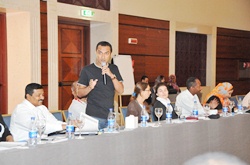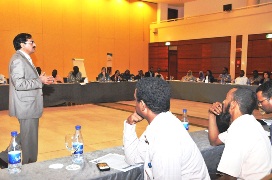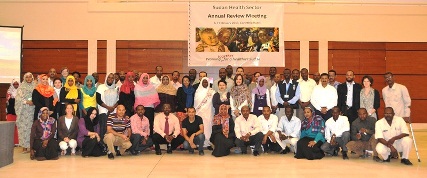 More than 50 health partners gathered in Khartoum to review its 2012 performance9 February 2013 - Some 50 health partners in Sudan gathered on 6 and 7 February at Corinthia Hotel in Khartoum to share experiences in the implementation of health cluster approach, as well as identify weaknesses in operational framework at the national and state level.
More than 50 health partners gathered in Khartoum to review its 2012 performance9 February 2013 - Some 50 health partners in Sudan gathered on 6 and 7 February at Corinthia Hotel in Khartoum to share experiences in the implementation of health cluster approach, as well as identify weaknesses in operational framework at the national and state level.
The two-day review meeting was geared towards strengthening networks and partnerships among national and international organizations working in health, along with Sudan’s Federal Ministry of Health.
Issues affecting health service delivery such as coordination and information, needs assessment, strategy development and planning, capacity building, monitoring and reporting, as well as resource mobilization were discussed and reviewed, while recommendations were drafted to improve operations of the health cluster at both country and state levels.
 Health partners drafted recommendations to improve the health cluster at both country and state levels.Sudan’s Federal Ministry of Health Undersecretary Dr Ismaeldin Mohamed Abdalla highlighted FMoH’s satisfaction over the sector’s performance in 2012. He emphasized the importance of coordination among organizations working on ground to ensure delivery of health services particularly to marginalized communities.
Health partners drafted recommendations to improve the health cluster at both country and state levels.Sudan’s Federal Ministry of Health Undersecretary Dr Ismaeldin Mohamed Abdalla highlighted FMoH’s satisfaction over the sector’s performance in 2012. He emphasized the importance of coordination among organizations working on ground to ensure delivery of health services particularly to marginalized communities.
Dr Anshu Banerjee, the World Health Organization’s Representative in Sudan said, “Reviewing cluster performance and functions at the national and state levels in both sudden onset and protracted crises is necessary to ensure that the cluster is efficient, has effective coordination mechanisms, fulfilling cores functions, meeting the needs of its members, and supporting delivery to affected people.” Banerjee added that the transformative agenda also focuses on three key areas: leadership, coordination and accountability.
The health cluster approach has been in operation since 2005, and was rolled-out in Sudan only in 2009. It gives opportunity to enhance coordination, effectively mobilize resources, and share information among partners.
 Health sector partners in Sudan who joined the annual review meeting on 6 and 7 February 2013.
Health sector partners in Sudan who joined the annual review meeting on 6 and 7 February 2013.


